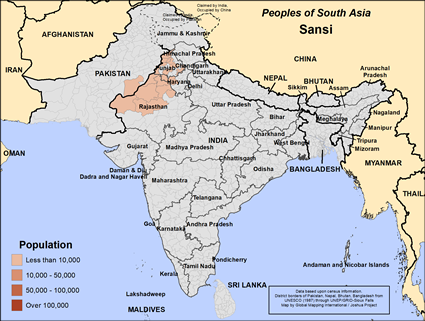Sansi in India

Send Joshua Project a photo
of this people group. |

Map Source:
People Group data: Omid. Map geography: UNESCO / GMI. Map Design: Joshua Project
|
| People Name: | Sansi |
| Country: | India |
| 10/40 Window: | Yes |
| Population: | 8,100 |
| World Population: | 8,100 |
| Primary Language: | Sansi |
| Primary Religion: | Hinduism |
| Christian Adherents: | 0.00 % |
| Evangelicals: | 0.00 % |
| Scripture: | Portions |
| Ministry Resources: | Yes |
| Jesus Film: | Yes |
| Audio Recordings: | Yes |
| People Cluster: | South Asia Hindu - other |
| Affinity Bloc: | South Asian Peoples |
| Progress Level: |
|
Introduction / History
The known history of the Sansi dates to their defeat in the Moghul Wars, which took place between the 1500s and the 1700s. When they lost their lands in these wars, the Sansi began to roam northern India and became known as a wandering community. They were forced to beg for food. To survive, some adopted habits such as stealing and cattle rustling, and became known as criminals during colonial days. The Sansi were under the Criminal Tribes Act during the British rule of India, and it was a source of disgrace for their community. That stigma is with them today making life difficult for them. In 1952 they were released from this stigma, at least on the government record books. They are sometimes shunned by other communities, giving them a reason to withdraw from outsiders.
Their language is endangered because they only speak it among themselves, and there are so few of them. Sansi people are considered a very low caste. Most of them are Hindus, and they live in Rajasthan and Punjab states.
What Are Their Lives Like?
Some Sansi are landless farmers and day laborers while others sell alcoholic drinks. Some of their children work in shops. A small number are nomadic. Unfortunately, most of the Sansi live in poverty. They have a low literacy level, so the gospel will need to be presented in oral form. They are secluded from other communities partly because they are rejected as criminals, and partly as a way of defending themselves from outsiders. They have a caste council to look after their needs and to settle disputes among them. Government designs to settle them in one place have been thwarted by their continual habit of selling or bartering any land that is given to them.
What Are Their Beliefs?
Most Sansi people practice Hinduism, the ancient religion of India. Hinduism is a catch-all phrase for the local religions of South Asia, so it is very diverse. At the popular level, Hindus worship and serve the gods of the Hindu pantheon. They visit Hindu temples and offer prayers, food, flowers, and incense to their gods in hopes of gaining protection and benefits. They do not have a personal or familial relationship with their gods like Christians or Jews. There are other Hindus who are much more philosophical, especially among the Brahmins.
Almost all Hindus participate in yearly celebrations like Holi, the festival of colors and the start of spring / Diwali, the festival of lights / Navratri, the celebration of autumn / and Rama Navami, Rama's birthday.
What Are Their Needs?
The Sansi people need opportunities to get better education so they can improve their economic lives.
Prayer Points
Pray for a move of the Holy Spirit to transform Hindu Sansi communities so they will have life to the full.
Pray that the Lord will call workers as gentle as doves but as sly as foxes to be able to identify with the Sansi people and share the way to eternal and abundant life with these precious black sheep.
Pray for spiritual hunger and discernment among Sansi people.